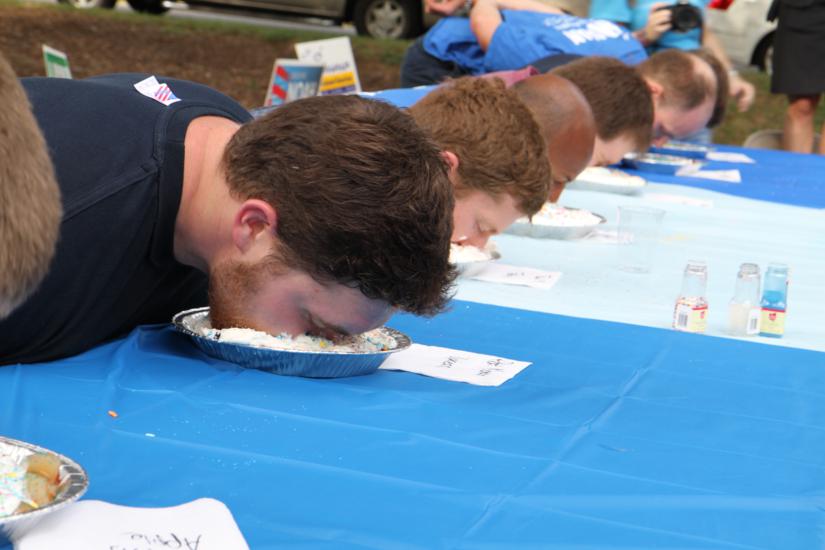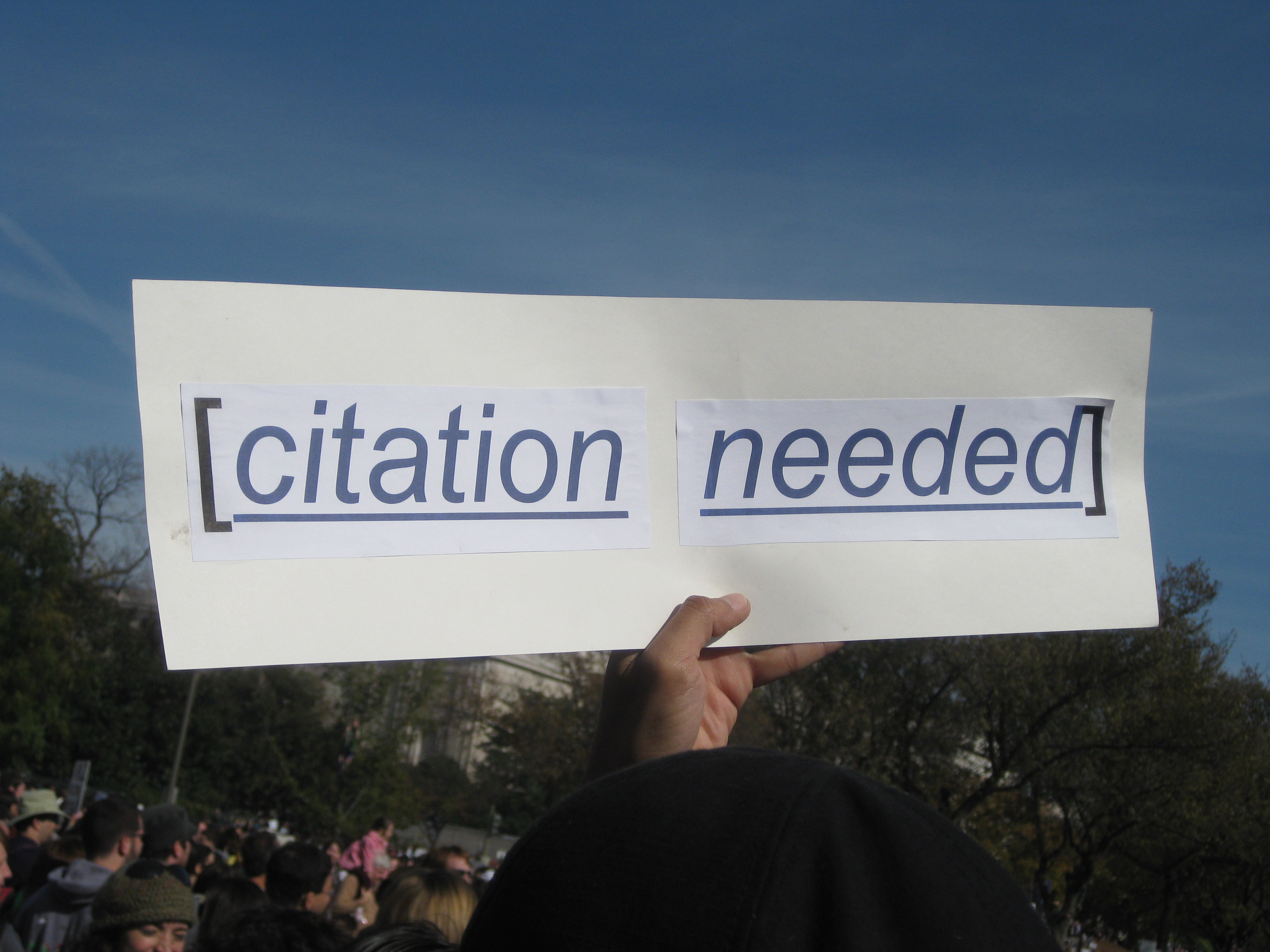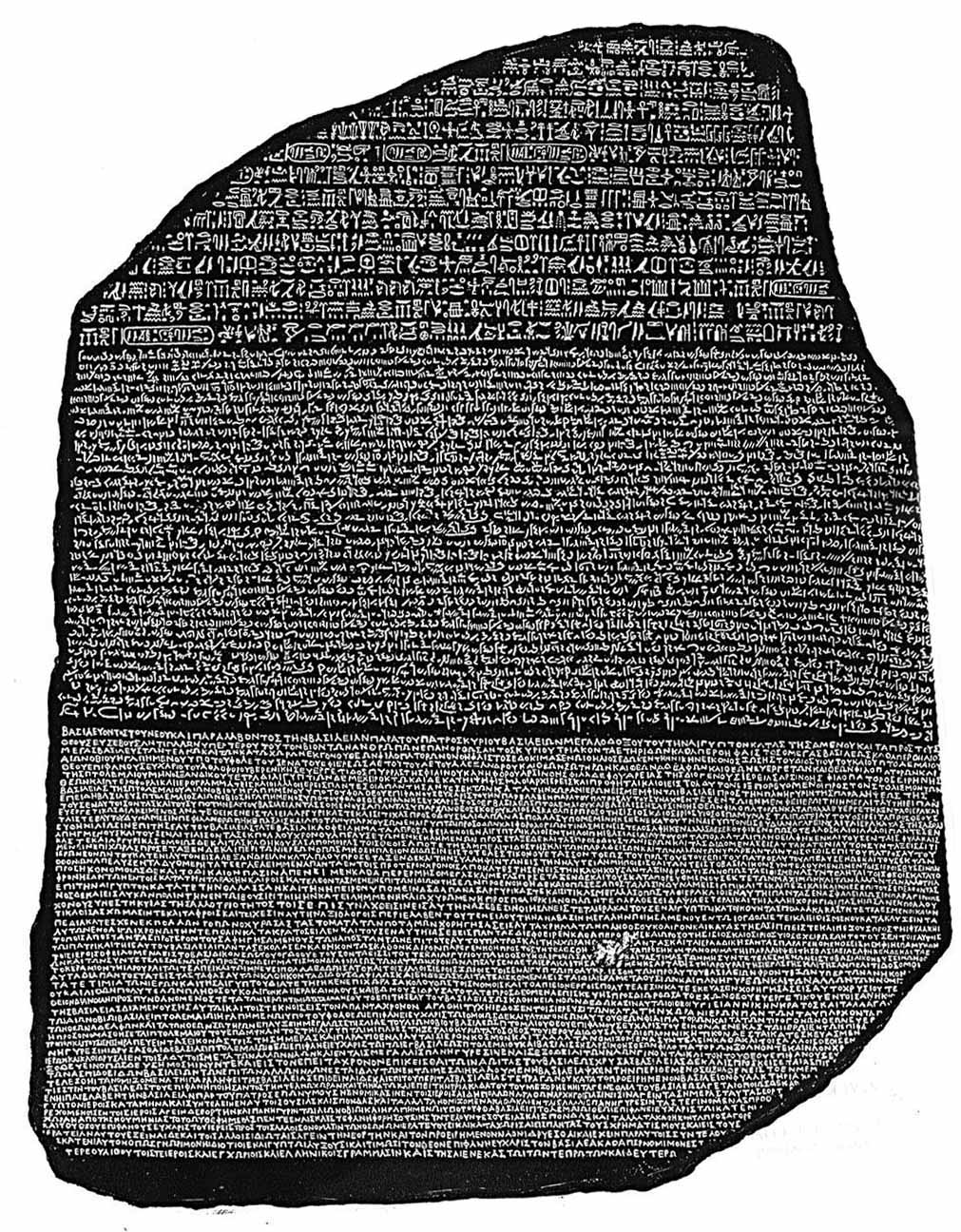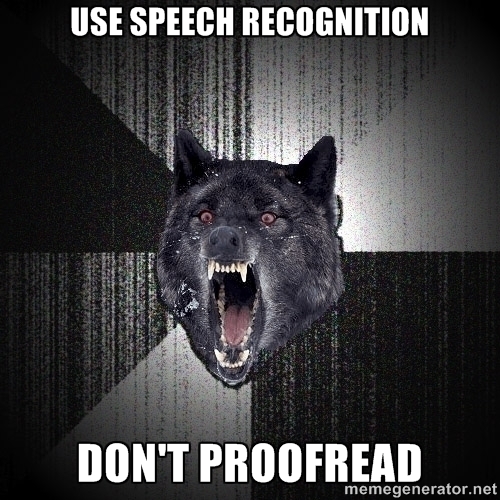What do you call an alligator in a vest? An investigator. --- ### This presentation is available (now) at: [http://www.savethevowels.org/talks/writing](http://www.savethevowels.org/talks/writing) ---  ## Writing Readably and Reading Writably Will Styler - Spring GTP Intensive 2014 --- # Who are you? --- ### Why "Writing Readably and Reading Writably"? --- ## What we won't be discussing today * Silly "grammar rules" <!-- .element: class="fragment" --> * Style Guides, APA, MLA, and other branches of Law <!-- .element: class="fragment" --> * Avoiding Plagiarism <!-- .element: class="fragment" --> * The specific writing conventions in your field <!-- .element: class="fragment" --> * Finding your muse <!-- .element: class="fragment" --> --- ## What we *will* be discussing: 1) How to plan a paper <!-- .element: class="fragment" --> 2) How to read things so you'll be able to write about them <!-- .element: class="fragment" --> 3) How to write so that your reader knows you don't hate them. <!-- .element: class="fragment" --> --- ## So, you need to write a big paper...  --- # Planning your writing --- ## Before you start working, you've got a few key questions to ask yourself. --- ## Why am I writing this? * "To impress my dissertation committee" <!-- .element: class="fragment" --> * "To fulfill this requirement" <!-- .element: class="fragment" --> * "To get into a journal" <!-- .element: class="fragment" --> * "For a class" <!-- .element: class="fragment" --> * "Dunno!" <!-- .element: class="fragment" --> ### This will determine the paper's structure <!-- .element: class="fragment" --> --- ## Who am I writing for? * Your professor or advisor? <!-- .element: class="fragment" --> * Your dissertation committee? <!-- .element: class="fragment" --> * People in your field <!-- .element: class="fragment" --> * Everybody! <!-- .element: class="fragment" --> ### This will help determine the level and register of the paper <!-- .element: class="fragment" --> --- ## What story am I telling? * What am I teaching? <!-- .element: class="fragment" --> * What will people get from reading my paper? <!-- .element: class="fragment" --> * Why should people pay attention to this paper? <!-- .element: class="fragment" --> * What am I arguing that's controversial? <!-- .element: class="fragment" --> * What new ground am I breaking? <!-- .element: class="fragment" --> ### This will determine the content and layout of your paper <!-- .element: class="fragment" --> --- ## What do I have to do to sell that story? * What can I avoid covering? <!-- .element: class="fragment" --> * What's already done for me? <!-- .element: class="fragment" --> * How can I cite it? <!-- .element: class="fragment" --> * Do I have to light any candles at anybody's altar? <!-- .element: class="fragment" --> * How is my committee likely to object? <!-- .element: class="fragment" --> ### This will determine what else you have to do during the paper. <!-- .element: class="fragment" --> --- ## Once you've asked yourself... ### Why am I writing this? <!-- .element: class="fragment" --> ### Who am I writing for? <!-- .element: class="fragment" --> ### What story am I telling? <!-- .element: class="fragment" --> ### What do I have to do to sell it? <!-- .element: class="fragment" --> ## Then... <!-- .element: class="fragment" --> --- ## Come up with a plan * An outline <!-- .element: class="fragment" --> * A Mind-Map <!-- .element: class="fragment" --> * An "elevator speech" <!-- .element: class="fragment" --> * "If I don't cover these 10 concepts or arguments well by the end of the paper, I will have failed" <!-- .element: class="fragment" --> * How do *you* plan your writing? <!-- .element: class="fragment" --> --- # This is important --- ### Right now, you see...  --- ### ... once you're writing, you'll only see  --- ## Your paper needs to make sense at both a macro and micro level ### Ensure this by checking against your plan <!-- .element: class="fragment" --> --- ## How do you plan your work? --- ## Now, you know what you're going to need to say ### So it's time for... <!-- .element: class="fragment" --> --- # Reading writably --- ### (I'm going to talk about "Papers", but the same principles apply with Non-Fiction books.) --- # The Biggest Mistake new Grad Students make: <!-- .element: class="fragment" --> ## Academic Reading is not fine dining<!-- .element: class="fragment" --> ---  ## Academic Reading is a pie-eating contest --- ## Academic Reading is a pie-eating contest * You do not have time to savor each paper <!-- .element: class="fragment" --> * You cannot approach these papers delicately <!-- .element: class="fragment" --> * You have more papers available than you could ever possibly read <!-- .element: class="fragment" --> * It's all about the prize <!-- .element: class="fragment" --> ---  ## You do not have the time nor the sanity to savor every paper or book. --- # How to win a paper-eating contest --- ## Step 1: Relax * Reading research papers is scary <!-- .element: class="fragment" --> * You will feel stupid <!-- .element: class="fragment" --> * You will not understand everything <!-- .element: class="fragment" --> * Google "Impostor Syndrome". You're not alone. <!-- .element: class="fragment" --> --- ## Step 2: Find papers which sound interesting [Google Scholar](http://scholar.google.com/)<!-- .element: class="fragment" --> [WorldCat](http://www.worldcat.org/)<!-- .element: class="fragment" --> Your advisor<!-- .element: class="fragment" --> Papers you've already got<!-- .element: class="fragment" --> --- # Then, for each paper... --- ## Step 3: Read the abstract. There are lots of papers which look interesting at a glance, but are worthless for you. <!-- .element: class="fragment" --> If the paper is no longer interesting then **Banish it!** <!-- .element: class="fragment" --> --- ## Step 4: Read the Intro/Conclusion/Final Discussion * Introductions are great for finding citations, and overviews of existing literature. <!-- .element: class="fragment" --> * Skip over the middle bit for now. <!-- .element: class="fragment" --> * Conclusions are more concise and include enough detail to give you a good idea of what actually was done. <!-- .element: class="fragment" --> * If the paper is no longer interesting, mine the citations then **Banish it!** <!-- .element: class="fragment" --> --- ## Make tough choices * Some papers are only worth reading the introduction and the conclusion. <!-- .element: class="fragment" --> * Some are worth skimming.<!-- .element: class="fragment" --> * Some are worth reading.<!-- .element: class="fragment" --> * Some are worth tearing apart and gnawing every last bit of knowledge off of their bones.<!-- .element: class="fragment" --> * **You can always come back later!** <!-- .element: class="fragment" --> --- ## If a paper isn't worth a full read... * Mine the citations for papers which might be interesting <!-- .element: class="fragment" --> * Stick it someplace in your computer or desk where you don't have to stare at it everyday, but can find it later. <!-- .element: class="fragment" --> * Programs like [BibDesk (Mac)](http://bibdesk.sourceforge.net/) or [Mendeley](http://www.mendeley.com/) are great for this. <!-- .element: class="fragment" --> --- ## If a paper deserves a full read...  <!-- .element: class="fragment" --> ### Don't just read the text! <!-- .element: class="fragment" --> --- ## Step 5: Read Purposefully! * Pick and choose your sections <!-- .element: class="fragment" --> * What story are they telling? <!-- .element: class="fragment" --> * Try to figure out what the author is doing <!-- .element: class="fragment" --> * Read purposefully <!-- .element: class="fragment" --> * Take some notes for later <!-- .element: class="fragment" --> --- ## Step 6: Fill in the blanks * This will often get skipped, as it’s VERY time-consuming <!-- .element: class="fragment" --> * If you don't understand something, search the earlier sections until you do. <!-- .element: class="fragment" --> * Some gaps mean that the author messed up. <!-- .element: class="fragment" --> * Some show an experiment or follow-up that you can do! <!-- .element: class="fragment" --> * This is that "gnawing every last bit of knowledge off of bones" thing. <!-- .element: class="fragment" --> --- ## Step 7: Skim once more and file! This cements everything into your head. <!-- .element: class="fragment" --> File the paper away so you can find it easily. <!-- .element: class="fragment" --> Assign keywords <!-- .element: class="fragment" --> Assign papers to different points in your plan <!-- .element: class="fragment" --> "(Use Solomon 2015 to discuss child speech perception)" <!-- .element: class="fragment" --> --- # In Summary: 1) Relax! <!-- .element: class="fragment" --> 2) Find an interesting-sounding paper <!-- .element: class="fragment" --> 3) Read the Abstract <!-- .element: class="fragment" --> 4) Read the Intro/Conclusion <!-- .element: class="fragment" --> - Make tough choices <!-- .element: class="fragment" --> 5) Read purposefully! <!-- .element: class="fragment" --> 6) Fill in the blanks <!-- .element: class="fragment" --> 7) Skim and file <!-- .element: class="fragment" --> --- ## You may have your own way to do this If it ain't broke, don't fix it! <!-- .element: class="fragment" --> --- ## Now, based on a bunch of research, you know... * What's interesting/noteworthy/controversial in the field <!-- .element: class="fragment" --> * Who proved what <!-- .element: class="fragment" --> * What's unknown <!-- .element: class="fragment" --> * What you want to teach the world. <!-- .element: class="fragment" --> --- # Now, you can write a paper ### ... but we want to write a *good* paper. <!-- .element: class="fragment" --> --- # Writing Readably --- ## When you're teaching... * You want your students to understand what you're saying. <!-- .element: class="fragment" --> * It's your responsibility to get the point across to all the students. <!-- .element: class="fragment" --> * If everybody in the class fails the test, it's your fault. <!-- .element: class="fragment" --> ### Teaching is all about the students! <!-- .element: class="fragment" --> --- ## Writing is a lot like teaching! --- ## When you're writing... * You want your readers to understand what you're saying. <!-- .element: class="fragment" --> * It's your responsibility to get the point across to all the readers. <!-- .element: class="fragment" --> * If the readers don't get it, it's your fault <!-- .element: class="fragment" --> ### Writing is all about the reader! <!-- .element: class="fragment" --> --- ### So, we like the reader, and want them to understand and like us. ## How can we focus on the reader? --- ### There are lots of books and [sites](https://www.google.com/#q=academic+writing+tips) out there on writing well. ### They're nice. <!-- .element: class="fragment" --> --- ### ... but it's tough to talk about what makes writing good ## So we're going to take the negative approach! <!-- .element: class="fragment" --> ---  --- ### Let's do a thought experiment --- ## "This is the Universe. You've been put in charge of punishing..." --- <img width="900" src="img/palpatine.jpg"> --- <img width="900" src="img/drevil.jpg"> --- <img src="img/cthulhu.jpg"> --- <img src="img/dalek.jpg"> --- <img width="900" src="img/sauron.jpg"> --- <img width="900" src="img/voldemort.jpg"> --- <img width="900" src="img/evilqueen.jpg"> --- <img src="img/satan.jpg"> --- ## "... but your punishment must come in the form of a research paper written on a topic in your field which they will read over and over for all eternity." --- ## What would you do if you were writing a paper designed to punish a truly evil reader? --- ## Since we're not punishing our readers, what should we avoid? ---  # Boring is bad! --- ## If you're not saying anything, stop talking! If this paragraph/section/page isn't helping your plans, don't include it!<!-- .element: class="fragment" --> ("Placating your committee" is sometimes a form of "helping your plan") <!-- .element: class="fragment" --> ---  ### "A Good paper is like a ninja: small enough to move quickly, but big enough to get the job done" --- ## Limit redundancy to limit redunancy! Revision adds redundancy <!-- .element: class="fragment" --> Go back through and trim so you're not explaining the same thing twice. <!-- .element: class="fragment" --> --- ## Long and pointless digressions are great punishment for your reader Your book about a crazed boat captain does not need 18 pages on the rendering of whale blubber. <!-- .element: class="fragment" --> (Yes, Herman Melville, I'm talking to you.) <!-- .element: class="fragment" --> --- ## Don't use 46 words to say what could be said in 4 "That said, in light of the previously discussed results of the present study, it becomes eminently clear that the overall impression, foundations, and understandings espoused the in Waterson paper discussed previously (2006) may not form a reliable basis for departure for future research, and should be reevaluated." <!-- .element: class="fragment" --> "This contradicts Waterson 2006." <!-- .element: class="fragment" --> Which author hates you? <!-- .element: class="fragment" --> --- ## Show how your paper relates to the rest of the world Who here naturally cares about the acoustics of vowel nasality? <!-- .element: class="fragment" --> If you don't show the reader why she should care, she won't. <!-- .element: class="fragment" --> ---  # Citation-related evils --- ## Don't cite ambiguously! "Will had toast for breakfast this morning, and tense vowels are longer than lax vowels (Rositzke 1931)" <!-- .element: class="fragment" --> Make it clear what you're citing, and where the end of the citation is. <!-- .element: class="fragment" --> --- ## Don't cite nothing Facts without sources are unusable. <!-- .element: class="fragment" --> You want people to see the foundations of your research. <!-- .element: class="fragment" --> Uncited papers smell like plagiarism. <!-- .element: class="fragment" --> Pay it forward. <!-- .element: class="fragment" --> --- ## Don't cite *everything*! "People use language to communicate. (Buckweiler 2003)" <!-- .element: class="fragment" --> You're being a pedantic twit. (Styler 2014) <!-- .element: class="fragment" --> ---  # Sins against clarity ---  ### You know that scene in crime dramas? --- ## Don't make your reader wonder if you're going to kill them. Share the plan! When you take them to the middle of nowhere without a plan, they'll get distracted <!-- .element: class="fragment" --> A known plan makes reading easier. <!-- .element: class="fragment" --> End your intro with a "Here's what we're gonna do" section. <!-- .element: class="fragment" --> Tell your reader the plan more often than you think you need to. <!-- .element: class="fragment" --> ---  --- ## Announce sharp turns! This allows readers to brace themselves for a change. <!-- .element: class="fragment" --> It keeps them from flying off the highway. <!-- .element: class="fragment" --> Any time you've had to change your thinking, let them change theirs. <!-- .element: class="fragment" --> --- ## Write so that other people can understand you too! Your points are always clear *to you*. <!-- .element: class="fragment" --> This has *no* relation to the reader's experience. <!-- .element: class="fragment" --> Make your points explicit more often than you think you need to. <!-- .element: class="fragment" --> Your commitee will *never* tell you "You made this too clear". <!-- .element: class="fragment" --> --- ## Include *all* the steps! People need to understand your process to evaluate it. <!-- .element: class="fragment" --> "Step 1: Record some people. Step 2: ???. Step 3: Significant data!" is not a valid structure. <!-- .element: class="fragment" --> Journal editors will slap you around for this. <!-- .element: class="fragment" --> --- # Epenthesis (When a vowel pops up between two consonants which would otherwise be awkward to pronounce. Like "Fishes") <!-- .element: class="fragment" --> --- ## Define fancy terms Definitions on first use are a show of mercy for your reader. <!-- .element: class="fragment" --> Define words which you might not expect a Freshman to understand. <!-- .element: class="fragment" --> Don't forget to define acronyms too! <!-- .element: class="fragment" --> Adjust for your audience. <!-- .element: class="fragment" --> --- ## Revise! A paper is like a chair. <!-- .element: class="fragment" --> You need to sit on it for a few days before you can trust it. <!-- .element: class="fragment" --> Don't touch your paper for 2-3 days, then re-read. <!-- .element: class="fragment" --> Sometimes things that made sense to past-you don't make sense to present-you. <!-- .element: class="fragment" --> Fix them! <!-- .element: class="fragment" --> [The Writing Center at Norlin](http://www.colorado.edu/pwr/writingcenter.html) offers editing! <!-- .element: class="fragment" --> ---  # Presentation Trainwrecks --- ## Typography and formatting matter  <!-- .element: class="fragment" --> --- don't make headers indistinguishable from content everybody loves that, right? <!-- .element: class="fragment" --> it really improves readability. <!-- .element: class="fragment" --> --- ### (Your word processor of choice can make this easier or harder. [LaTeX](http://savethevowels.org/latex/) can make pretty easy.) ### ... and avoid the most terrible formatting punishment of all... <!-- .element: class="fragment" --> --- <font face="Comic Sans MS"><h1>Don't use Comic Sans</h1></font> ---  # Language Issues --- ## Dont leeve typose If you're paper has alot of problesm wit typoe, its realy distracting <!-- .element: class="fragment" --> A poorly-edited paper takes steam away from the actual arguments. <!-- .element: class="fragment" --> ---  --- ## Grammar is important too Focus on grammatical issues that make things unclear. <!-- .element: class="fragment" --> Ignore the [made up issues found in style guides](http://en.wikipedia.org/wiki/The_Elements_of_Style#Criticism) <!-- .element: class="fragment" --> If I can't understand your language, you can't make your point <!-- .element: class="fragment" --> See [The Writing Center at Norlin](http://www.colorado.edu/pwr/writingcenter.html) for free help. <!-- .element: class="fragment" --> --- ## What forms of writing sadism have I missed? --- ### These are great ways to show your readers that you hate them ## ... yet people make these mistakes all the time! <!-- .element: class="fragment" --> --- # So, in summary, if you're writing a paper... --- ## Ask yourself the key questions 1) Why are you writing this? <!-- .element: class="fragment" --> 2) Who are you writing this for? <!-- .element: class="fragment" --> 3) What story are you telling? <!-- .element: class="fragment" --> 4) What do I have to do to sell this story? <!-- .element: class="fragment" --> 5) What's my plan? <!-- .element: class="fragment" --> ... and most importantly of all... <!-- .element: class="fragment" --> 6) Do I despise the reader with the fire of 1000 burning suns? <!-- .element: class="fragment" --> --- ## ... and if you don't hate your reader: * Keep it concise and interesting <!-- .element: class="fragment" --> * Don't over-cite or under-cite <!-- .element: class="fragment" --> * Don't make the reader wonder if you're going to kill them in a forest somewhere <!-- .element: class="fragment" --> * Signal sharp turns with good transitions <!-- .element: class="fragment" --> * Make sure you're fully explaining yourself to somebody who isn't you <!-- .element: class="fragment" --> * Proofread, make it grammatical, and make it look good! <!-- .element: class="fragment" --> ** ... and most of all** <!-- .element: class="fragment" --> --- ### Remember that writing is teaching, and you want to be good to your students! --- <huge>Thank you!</huge> Will Styler - will@savethevowels.org http://savethevowels.org/talks/writing ---